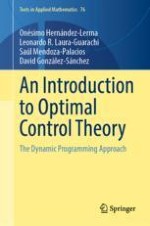2023 | OriginalPaper | Buchkapitel
5. Continuous–Time Markov Control Processes
verfasst von : Onésimo Hernández-Lerma, Leonardo R. Laura-Guarachi, Saul Mendoza-Palacios, David González-Sánchez
Erschienen in: An Introduction to Optimal Control Theory
Aktivieren Sie unsere intelligente Suche, um passende Fachinhalte oder Patente zu finden.
Wählen Sie Textabschnitte aus um mit Künstlicher Intelligenz passenden Patente zu finden. powered by
Markieren Sie Textabschnitte, um KI-gestützt weitere passende Inhalte zu finden. powered by
